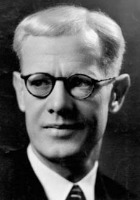James Martin Devaney
James Martin Devaney Poems
Week after week it shrank and shrank
as the fierce drought fiend drank and drank,
till on the bone-dry bed revealed
the mud peeled;
...
Oh, came you up by the place of dread
(west red, and the moon low down)
where no winds blow and the birds have fled
...
Leaning against the wind across the paddock ways
comes Dan home with forward stoop like a man bent and old,
...
Dirrawan went into the bush to spear waat,
but he forgot about waat the red wallaby.
he thought about dirridirri the small bird and deereeree the wagtail
he thought about wonning the lightning and tumberumba the thunder.
...
Because I went the lone ways
Among the tall trees,
Because I loved the blue days,
The bird melodies
...
The tufted gums along the rise
Stand black against the evening skies.
And in the red west sombreing
As daylight dies,
...
James Martin Devaney Biography
James Martin Devaney, poet, novelist, journalist and teacher, was born on 31 May 1890 at Sandhurst, Victoria, fourth child of Patrick Devaney, a labourer from Ireland, and his native-born wife Mary, née Conroy. Educated at Bendigo and at St Joseph's College, Hunters Hill, Sydney, in 1904 James entered the college's Marist Brothers' juniorate. In 1915 he made his final vows and took the religious name Fabian Joseph. Trained as a teacher, from 1911 he successively served in schools in Sydney, South Australia and New Zealand. Brother Fabian contracted severe tuberculosis and returned to Sydney in 1919 to teach at Darlinghurst. His Superior so relentlessly opposed adequate medical treatment that, driven to the point of despair, Devaney left the Order in July 1921. He recuperated in a sanatorium near Rockhampton, Queensland, and at the Diamantina Hospital, Brisbane. On 29 November 1924 at the Church of Mary Immaculate, Annerley, he married his nurse Phyllis Norah de Winton; they were to remain childless. Living mostly in the Brisbane district, and at times in Sydney and at the Blue Mountains, Devaney established a career as a freelance journalist. Under the pen-name 'Fabian', from 1924 to 1943 he contributed a nature column to the Brisbane Courier (Courier-Mail from 1933) which was syndicated in other Queensland newspapers. He had a long association with the Catholic Leader as editor of its literary page and on occasions was acting-editor. His volumes of verse, Fabian (Melbourne, 1923), Earth Kindred (Melbourne, 1931), Dark Road (Melbourne, 1938) and Where the Wind Goes (Sydney, 1939), established him as a fine lyric poet, well regarded by contemporary critics. Poems (Sydney, 1950) brought together selections from his earlier works and from Freight of Dreams which had been printed in Melbourne, but not released, in 1946. In Poetry in Our Time (Melbourne, 1952) he confronted modernism and forcefully expounded his own beliefs, but was seen by many critics as reactionary. Although his two historical novels, Currency Lass (Sydney, 1927) and Washdirt (Melbourne, 1946), were less successful, a volume of vivid and imaginative stories based on Aboriginal lore, Vanished Tribes (Sydney, 1929), enjoyed popular success; it was later used in schools and was an influence in the formation of the Jindyworobak movement. The New Law (Brisbane, 1955), a dramatic dialogue set in biblical times, received little critical attention. Devaney played a leading role in the vigorous local literary community of the 1930s and 1940s: he provided a focus for the Catholic Poetry Society and was president (1944-45) of the Queensland Authors' and Artists' Association. While John Shaw Neilson convalesced in Devaney's Brisbane home in 1941, Devaney helped to transcribe his poems. His spirited defence of Neilson's painstaking craftsmanship—Shaw Neilson (Sydney, 1944)—disposed of criticism of Neilson as an 'instinctive warbler' and a 'thoughtless mystic'. In 1947 he edited the Unpublished Poems of Shaw Neilson (Sydney). That year he delivered lectures under the auspices of the Commonwealth Literary Fund, from which he subsequently received a pension. He supported the writing community through lectures and workshops, encouraged writers such as Oodgeroo Noonuccal (Kath Walker) and assisted others financially in the publication of their works. In 1958, in company with Professor Manning Clark and Judah Waten, he represented Australian writers on a visit to the Soviet Union. Having interrupted his journalism, Devaney found it difficult to obtain the same work after World War II. In 1946 he had returned to teaching, first in Victoria and then at pastoral stations in Queensland. He resigned from his last post in February 1962 to nurse his wife. She died from a drug overdose in July. Her addiction had resulted in their virtual separation from the mid-1940s, but he had continued to hope for the eventual restoration of their domestic life. Tall, spare, gentlemanly and modest, Devaney was a humanitarian with a deep-rooted sense of justice. He remained a staunch Catholic, but no sectarian, who opposed intolerance and narrow-mindedness within the Church. Never afraid to speak his mind, he supported the Labor Party, advocated 'a democracy free from the monarchy' and was reputed to have declined appointment as M.B.E. in 1968. He died on 14 August 1976 in Brisbane and was buried in Redcliffe cemetery.)
The Best Poem Of James Martin Devaney
The Frog Pool
Week after week it shrank and shrank
as the fierce drought fiend drank and drank,
till on the bone-dry bed revealed
the mud peeled;
but now tonight is steamy-warm,
heavy with hint of thunderstorm.
And hark! hark! hoarse and harsh
the throaty croak of the frogs in the marsh:
"Wake! wake! awake! awake!
The drought break!"
but no, that chorus seems to me
more a primeval harmony.
The thunder booms, the floods flow
blended with deeper din below,
and every time the skies crash
the swamps flash!
and the whole place will be tonight
a pandemonium of delight.
